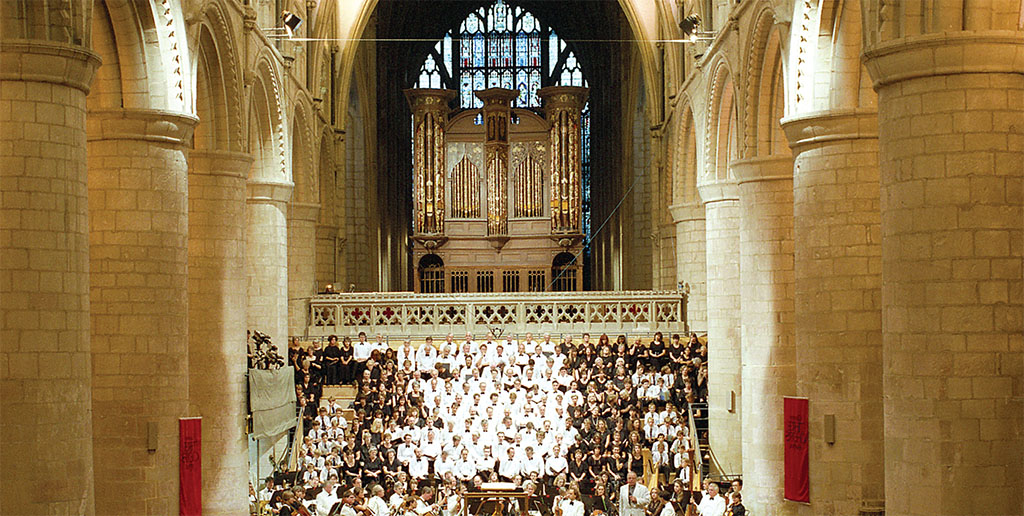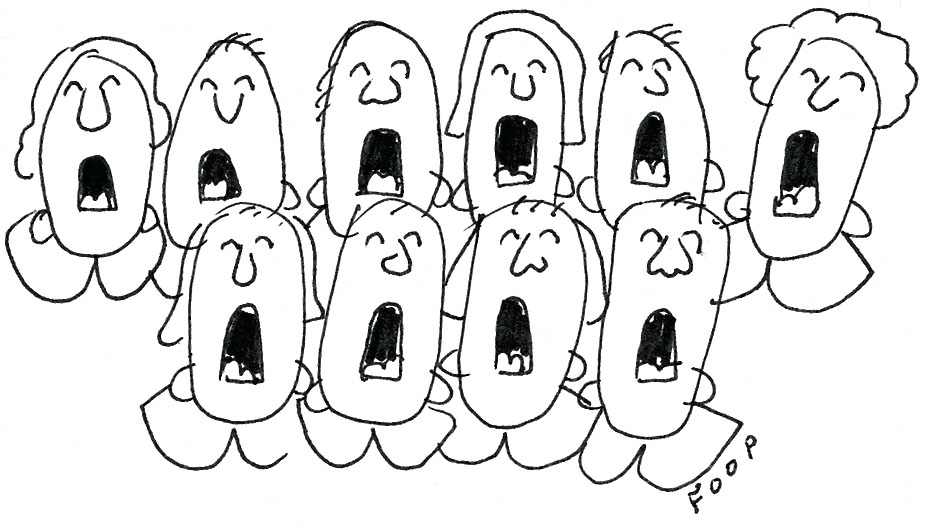
Since 1715, the world’s oldest choir festival has convened each summer in the cathedral cities of the Marches. This year, it’s Gloucester Cathedral’s turn to host
[caption id="TheThreeChoirsFestival_Feature" align="aligncenter" width="1024"]

COURTESY OF THE THREE CHOIRS FESTIVAL
[caption id="TheThreeChoirsFestival_img1" align="aligncenter" width="928"]

MICHAEL FOOP
APEEVISH WILLIAM COBBETT recalled in his Rural Rides the difficulty of finding a bed for the night on a visit to Gloucester in 1826: “For, what should there be here, but one of those scandalous and beastly fruits of the system, called a ‘music meeting’! Those who founded the cathedrals never dreamed, I dare say, that they would have been put to such uses as this! They are upon these occasions, made use of as Opera-Houses….”
In fact, Cobbett had stumbled upon an early incarnation of the Three Choirs Festival, one of the oldest music festivals in the world. The neighboring cathedral cities of Gloucester, Hereford and Worcester, close to the hills of England’s border with southeast Wales, take it in turns each year to host a weeklong program of choral and orchestral concerts. British music is very much center stage as the eponymous Three Cathedral Choirs sing evensongs, services and a major concert, while daytime performances of chamber music, organ recitals, talks and exhibitions are held across town. This year, it’s Gloucester’s turn. The 2007 festival, August 4-11, also features celebratory renditions of one of its great associates—Edward Elgar, who was born 150 years ago.
The origins of this annual tradition date back at least to 1715 (Anthony Boden’s Three Choirs: A History of the Festival gives a detailed account of its evolution). With breaks for two world wars, that makes Gloucester 2007 the 280th event. In the beginning it was a musical meeting, mainly of lay clerks (professional cathedral singers) from the three cities, and the purpose was social: Audiences gathered in music clubs to quaff and listen to secular music—banned at that time from cathedrals. Alongside balls and horse racing, the meetings became part of the gentry’s season. Then from 1724, at the urging of chancellor of Hereford Cathedral Thomas Bisse, a charitable purpose was introduced, with money collected for the relief of orphans of the poorer clergy or choir members.
Entertainment could be a curious hybrid of the high and low brow. At Gloucester in 1847, for instance, stellar performances of operatic arias and duets were followed on stage by comic singing by one John Parry, a “shaker of sides.” The audience, seeing nothing incongruous in the pairing, was duly enraptured. London critics and sophisticates, though, were wont to disparage the parochial nature and uneven standard of such programs.
Arguments raged, too, as to whether the performance of secular works should be permitted in cathedrals, with Cobbett’s disgruntled views on the matter quite clear. Even Handel’s Messiah was consigned to the cities’ public halls until Three Choirs at Hereford in 1759, when the cathedral was persuaded to open its doors.
Despite all this, Three Choirs attracted operatic stars throughout the 19th century and established itself as a major national festival. Key to its success was its very own blend of the provincial and the world class, and the friendly atmosphere of small cities awash with “a brim-full but quiet happification,” as The Musical World glowingly reported of Worcester 1854.
Many concertgoers returned year after year, eager for what became the popular mainstays of programs—Henry Purcell, then Handel and Messiah in the 18th century (once it had stormed the ecclesiastical barricades), Mendelssohn and Elijah in the 19th century. Though repetitive, the old favorites were good box office and helped pay for the launching of lesser-known works.
Audiences were also rewarded with firsts and landmark performances. That at Gloucester on September 7, 1880, has been cited as the birthday for modern English music, when Hubert Parry’s dramatic, if immature, cantata Prometheus Unbound rattled the conventions of home-grown choral traditions, according to Ernest Walker in A History of Music in England. Another man with local connections, Edward Elgar, carried England’s musical renaissance further with the premiere of his Froissart overture at Worcester 1890. And that most English of composers, Gloucestershire-born Ralph Vaughan Williams, began a long Three Choirs affiliation writing and conducting his Tallis Fantasia for Gloucester 1910. Gloucester-born composer/poet Ivor Gurney, Lydney-born Herbert Howells (Hymnus Paradisi) and Cheltenham-born Gustav Holst all found a platform at Three Choirs. The works of the men who helped put an end to the 19th-century notion that England was a land without music have flourished at the festival ever since.
How would they have fared without their local stage, the chance to write for it and be performed there? Elgar for one owed—and gave—much to Three Choirs, dominating programs with works like The Dream of Gerontius and Enigma Variations. In his anniversary year we’re treated to both. At the composer’s birthplace—now a museum—at Lower Broadheath near Worcester, visitors can appreciate the quiet Herefordshire country lanes, where he pedaled his Sunbeam bicycle, and the Malvern Hills and other locations that so inspired him.
‘It all promises well for another brim-full of happification’
The leitmotif of mixing box-office draws with innovation continues today. Paul Hedley, Gloucester Festival director, describes programming as a “tightrope” in terms of getting the balance right. “For example, on Monday 6 we’re giving the UK premiere of a Debussy orchestration by Robin Holloway, composer-inresidence at Gloucester Cathedral. In the same concert we have Vaughan Williams’ Serenade to Music in its original version with 16 solo voices, which not many people have heard, and a traditional Three Choirs piece, Howells’ Hymnus Paradisi.” Contemporary composers are championed, too—Elizabeth Maconchy, Graham Whettam and Hugh Wood.
Preparations for this year’s festival began at least 18 months ago, with program themes emerging through discussions between artistic director/festival conductor Andrew Nethsingha and his colleagues. “Gerontius and other Elgar works had to be there because of the 150th anniversary,” Hedley says. “That provided a skeleton, and we tried to come up with some sort of academic architecture linking the whole festival. It moves through the themes of death and sacrifice—Benjamin Britten’s War Requiem, his response to the Second World War, Gerontius, Monteverdi’s Vespers, and The Spirit of England which Elgar wrote toward the end of World War I. It’s all drawn together in the final evening concert and Mahler’s Symphony No. 8, culminating in redemption through love in the setting of Goethe.”
Highlights, of course, are the 60-strong united Three Cathedral Choirs, a Festival Chorus of some 180 singers drawn from the cities, the Philharmonia Orchestra—and the 900-year-old cathedral itself where the main concerts take place. The glorious building is transformed into a concert hall with bespoke audience seating for up to 1,800 people and a performance platform in front of the organ screen. “The nave is so large that without seating there is an echo of seven or eight seconds!” Hedley reveals.
Across Gloucester and beyond, there’s a rich variety of fringe events in Three Choirs Plus: theater, art and craft exhibitions, an ongoing outreach project to take music to the elderly in residential homes, and a night of multiethnic, multifaith singing by a mass community choir in the cathedral. And—another hallmark of this friendly festival—there will be plenty of socializing among public and performers in the Festival Club, in the King’s School beside the cathedral.
It all promises well for another brim-full of happification, as well as maybe some surprises. “A few years ago, during a Messiah performance, the bass soloist was taken ill,” Hedley says. “The then festival secretary, who was a lay clerk in the cathedral, as I am, stepped onto the platform and took his place for the second half. It made the national newspapers.” He isn’t hoping for any such celebrity.
Festival information www.3choirs.org.





Comments